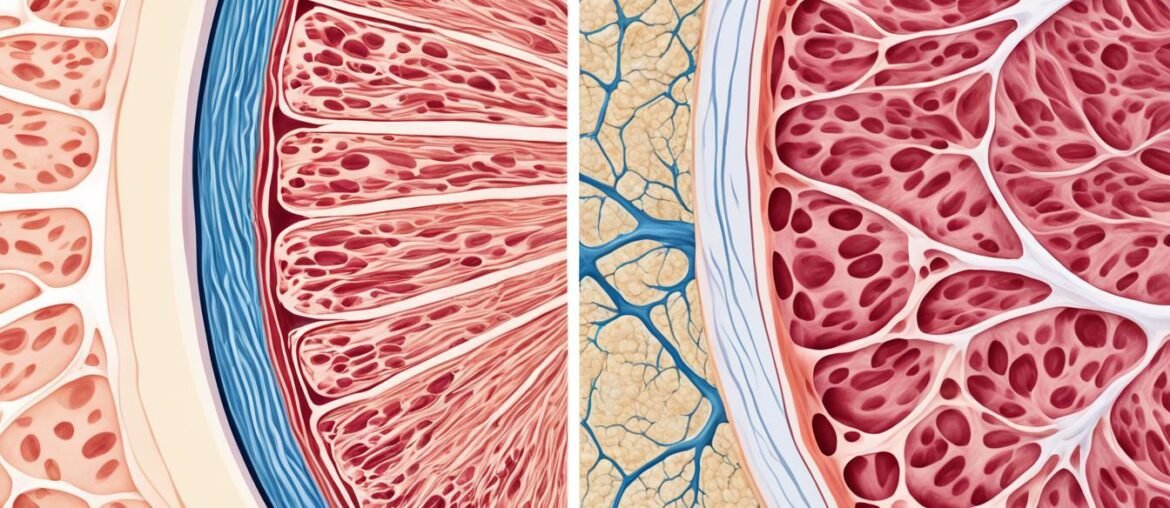Did you know that your sleeping patterns can significantly affect the aging process of your skin? It turns out that getting enough quality sleep is not only essential for your overall well-being, but it also plays a crucial role in maintaining healthy, youthful skin.
Chronic poor sleep quality has been found to accelerate the visible signs of aging and negatively impact skin health. From wrinkles and fine lines to impaired skin barrier function, the effects of poor sleep on your skin can be surprisingly significant.
In this article, we will explore the link between sleep and skin health, examine the effects of sleep deprivation on the skin, and discuss the benefits of quality sleep for maintaining a youthful complexion. We will also provide practical tips for improving your sleeping patterns and preventing skin aging.
Key Takeaways:
- Poor sleep quality can accelerate the visible signs of skin aging, such as wrinkles and fine lines.
- Lack of sleep can impair the skin barrier function, leading to increased transepidermal water loss and slower recovery from UV damage.
- Quality sleep plays a crucial role in collagen production and skin rejuvenation.
- Melatonin, a hormone that regulates sleep-wake cycles, has anti-aging effects on the skin.
- Stress management, sun protection, and a balanced diet can further enhance the benefits of quality sleep for skin health.
The Link Between Sleep and Skin
A good night’s sleep is not only essential for overall well-being but also plays a crucial role in maintaining healthy and youthful skin. The impact of sleep on skin health goes beyond just preventing dark circles and puffiness. Poor sleep quality has been strongly associated with increased signs of intrinsic skin aging, such as wrinkles and fine lines.
When we sleep, our body undergoes crucial processes of repair and rejuvenation, including skin cell renewal and collagen synthesis. Lack of sleep disrupts these essential processes, leading to visible signs of premature aging. The damaging effects of inadequate sleep are not limited to the surface of the skin but also extend to its inner layers.
“Quality sleep is like a daily beauty treatment for your skin. It allows the skin to repair and regenerate, resulting in a smoother, more youthful complexion.”
One of the key ways sleep affects skin aging is through its impact on the skin barrier function. A healthy skin barrier acts as a protective shield, preventing moisture loss and protecting against external stressors. However, poor sleep quality can compromise this barrier, leading to increased transepidermal water loss and decreased skin hydration. As a result, the skin becomes dry, dull, and more susceptible to environmental damage.
| Skin Concerns Associated with Poor Sleep Quality | Effects of Inadequate Sleep |
|---|---|
| Wrinkles and fine lines | |
| Impaired skin barrier function | Increased transepidermal water loss and slow recovery from UV damage |
| Lower satisfaction with appearance | Diminished self-perception of skin health and overall attractiveness |
Poor sleep quality also affects the skin’s ability to recover from damage caused by exposure to UV light. Sleep deprivation hinders the skin’s natural healing and regenerative processes, leading to a slower recovery time for sun-induced skin damage. This can manifest in the form of sunburn, uneven pigmentation, and a compromised skin barrier.
Furthermore, studies have shown that poor sleepers tend to have lower satisfaction with their appearance compared to individuals who get sufficient, quality sleep. This can lead to decreased self-confidence and affect social interactions.
In summary, getting enough quality sleep is crucial for maintaining healthy and youthful skin. It not only helps prevent visible signs of aging but also supports the skin’s natural repair and rejuvenation processes. Prioritizing good sleep hygiene, such as sticking to a consistent sleep schedule and creating a sleep-friendly environment, can go a long way in promoting skin health and preventing premature aging.
Sleep and Skin Aging: The Key Takeaways
- Poor sleep quality is associated with increased signs of intrinsic skin aging, including wrinkles and fine lines.
- Inadequate sleep can impair the skin barrier function, leading to increased water loss and decreased hydration.
- Sleep deprivation hinders the skin’s ability to recover from UV damage and slows down the healing process.
- Poor sleep quality can contribute to lower satisfaction with appearance and self-perception of skin health.
Effects of Sleep Deprivation on Skin
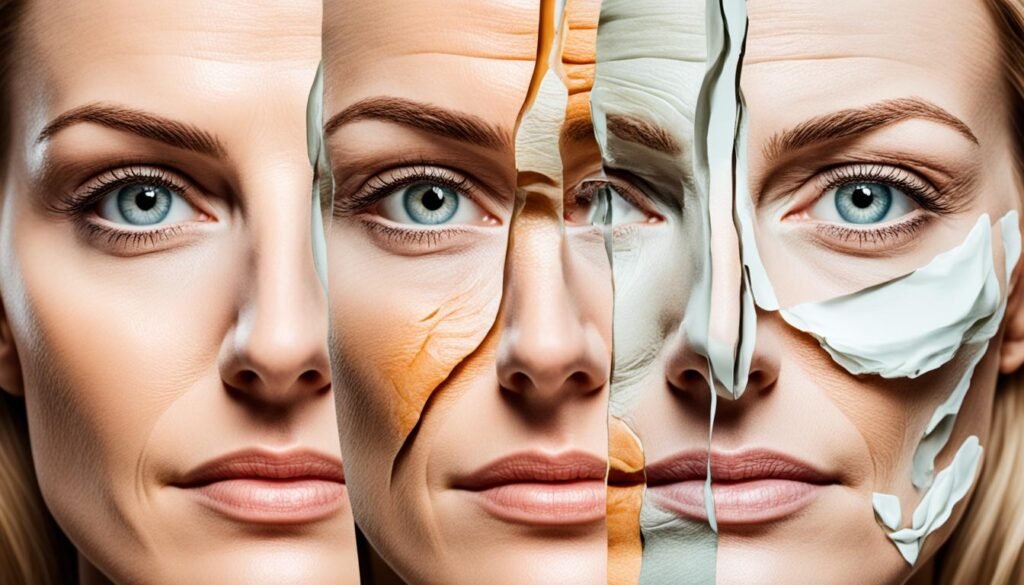
Sleep deprivation can have significant effects on the health and appearance of our skin. When we lack sufficient sleep, our skin suffers, leading to various issues that contribute to the appearance of aging skin.
1. Paler Skin and Dark Circles
One of the immediate effects of sleep deprivation is paler skin. When we don’t get enough sleep, our blood circulation decreases, resulting in a paler complexion. Additionally, dark circles under the eyes become more prominent, giving the appearance of tiredness and fatigue.
2. Wrinkles and Drooping Eyelids
Sleep deprivation can accelerate the formation of wrinkles and fine lines on the skin. Without adequate rest, our skin’s ability to produce collagen, a protein responsible for maintaining skin elasticity, is compromised. This can lead to the development of wrinkles and sagging skin, including drooping eyelids.
3. Changes in Complexion
Lack of sleep can also affect our skin complexion. Sleep deprivation can cause skin to become dry, dehydrated, and flaky. On the other hand, it can also trigger an increase in the production of oily secretions, contributing to a more oily and shiny appearance.
4. Impact on Face Perception
Not getting enough sleep can have an impact on face perception. Studies have shown that sleep-deprived individuals tend to appear sadder and more fatigued to others. This can affect how we are perceived in social interactions and may have negative consequences on our self-esteem and overall well-being.
To better understand the effects of sleep deprivation on the skin, a visual representation is provided below:
| Effects of Sleep Deprivation on Skin | Visual Representation |
|---|---|
| Paler Skin and Dark Circles | Increased visibility of a pale complexion and dark circles under the eyes |
| Wrinkles and Drooping Eyelids | Accelerated formation of wrinkles and sagging skin, including drooping eyelids |
| Changes in Complexion | Dryness, dehydration, flakiness, or increased oiliness and shine |
| Impact on Face Perception | Perceived as sadder and more fatigued by others |
It’s clear that sleep deprivation can have a significant impact on our skin’s health and appearance. To maintain youthful and healthy skin, it is crucial to prioritize quality sleep and ensure we get adequate rest.
Benefits of Quality Sleep for Skin
When it comes to maintaining healthy skin, quality sleep is a game-changer. Not only does a good night’s rest leave you feeling refreshed and energized, but it also provides numerous benefits for your skin. Let’s explore how quality sleep contributes to skin rejuvenation, collagen production, and overall skin health.
1. Skin Rejuvenation
During sleep, your body goes into repair mode, and this applies to your skin as well. While you sleep, your skin cells regenerate and repair themselves from daily exposure to environmental stressors, such as UV light and pollution. This rejuvenation process helps to restore the skin’s vitality, leaving it looking refreshed and glowing.
2. Collagen Production
Collagen is a protein that is essential for maintaining skin elasticity and firmness. It provides structure and support to the skin, reducing the appearance of wrinkles and fine lines. Quality sleep plays a vital role in collagen production, as it triggers the release of growth hormones that aid in muscle growth and cell repair, including the production of collagen. This natural boost in collagen during sleep helps to keep your skin plump and youthful.
| Benefits of Quality Sleep for Skin |
|---|
| Skin Rejuvenation |
| Collagen Production |
3. Enhanced Skin Health
In addition to skin rejuvenation and collagen production, quality sleep also promotes overall skin health. Optimal sleep allows the skin to restore its natural balance and repair any damage caused by daily exposure to environmental factors. This includes the recovery from UV light exposure, which can lead to premature aging and skin damage.
“Quality sleep not only rejuvenates your body, but also helps your skin reclaim its natural beauty.”
It is evident that quality sleep is an essential component of any skincare regimen. By prioritizing a good night’s rest, you can enjoy the benefits of skin rejuvenation, collagen production, and overall improved skin health. Make sleep a priority, and wake up to healthier, more radiant skin.
The Role of Melatonin in Skin Health
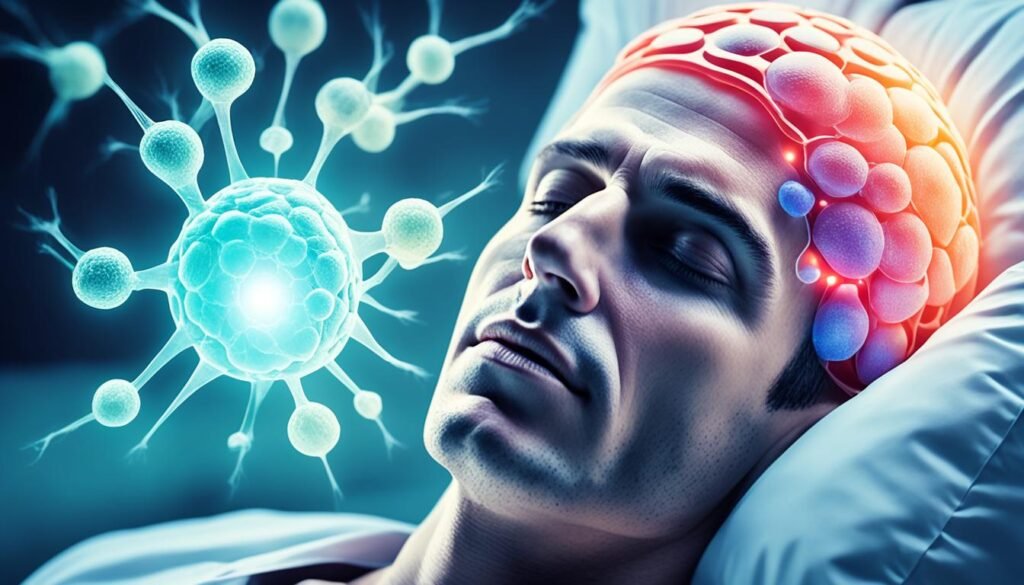
Melatonin, a hormone that regulates sleep-wake cycles, plays a vital role in maintaining skin health. Its powerful antioxidant properties make it a valuable asset in protecting against oxidative stress, a primary contributor to skin aging.
Research has shown that melatonin has anti-aging effects on the skin, such as reducing wrinkles and improving skin elasticity. By regulating the body’s circadian rhythm, melatonin influences various skin functions, including the repair of damaged skin cells and the maintenance of a clear complexion.
The antioxidant properties of melatonin help neutralize free radicals, which can damage skin cells and accelerate the aging process. By combating oxidative stress, melatonin helps preserve the youthfulness and vitality of the skin.
In addition to its antioxidant effects, melatonin also aids in the synchronization of biological processes, including the production of collagen, a crucial protein for maintaining skin elasticity and reducing the appearance of wrinkles.
Overall, melatonin’s multifaceted role in sleep regulation and skin health makes it an essential component in maintaining a youthful, healthy complexion.
Antioxidant Benefits of Melatonin for Skin Health
| Benefit | Description |
|---|---|
| Reduces Wrinkles | Melatonin helps diminish the appearance of wrinkles and fine lines by promoting collagen production and improving skin elasticity. |
| Improves Skin Elasticity | The antioxidant properties of melatonin support the maintenance of skin elasticity, reducing sagging and promoting a firm, youthful appearance. |
| Protects Against Oxidative Stress | Melatonin acts as a potent antioxidant, neutralizing free radicals that can damage skin cells and accelerate the aging process. |
The Impact of Sleep on Inflammation and Immune Function
Quality sleep plays a crucial role in maintaining a healthy immune system and regulating inflammation in the body. Lack of sleep can have detrimental effects on the skin, leading to increased production of inflammatory cytokines that contribute to skin inflammation and impair the skin’s ability to heal. The connection between sleep and inflammation is significant, as chronic inflammation can accelerate the aging process and contribute to various skin conditions.
Several studies have shown that sleep deprivation increases levels of pro-inflammatory markers in the body, including C-reactive protein (CRP) and interleukin-6 (IL-6). These markers are indicators of systemic inflammation and have been linked to numerous chronic health conditions, including skin aging.
Furthermore, sleep deprivation can lead to increased oxidative stress, which causes an imbalance between the production of free radicals and the body’s ability to detoxify them. This oxidative stress can damage cells, including skin cells, and impair the skin’s ability to repair itself.
Not only does sleep deprivation contribute to inflammation, but it also affects the body’s immune function. During sleep, the immune system replenishes and strengthens itself, making it better equipped to fight off infections and heal damaged tissues. Sleep deprivation weakens the immune system, making individuals more susceptible to infections and reducing their ability to heal wounds, including those on the skin.
Sleep deprivation disrupts the delicate balance between inflammation and immune function, leading to a cascade of negative effects on the skin’s health and appearance.
The Role of Inflammatory Cytokines
Inflammatory cytokines play a critical role in the body’s immune response. These small proteins regulate inflammation and help coordinate the immune system’s defense against infections and injuries. However, chronic sleep deprivation can cause an overproduction of these cytokines, leading to persistent inflammation and detrimental effects on the skin.
Cytokines such as tumor necrosis factor-alpha (TNF-α) and interleukin-1 (IL-1) can disrupt the skin’s barrier function, leading to increased transepidermal water loss and impaired protection against external irritants. This can result in dryness, sensitivity, and a weakened defense against environmental stressors, such as UV radiation and pollutants.
Additionally, the increased production of pro-inflammatory cytokines can activate enzymes that break down collagen, the protein responsible for maintaining skin elasticity. Collagen degradation can lead to sagging skin, wrinkles, and a loss of firmness.
Impact on Skin Aging
Chronic inflammation resulting from sleep deprivation can contribute to premature skin aging. Inflammatory processes generate free radicals, which can damage DNA and degrade collagen and elastin fibers, further exacerbating the signs of aging. The cumulative effects of inflammation and oxidative stress on the skin can manifest as fine lines, wrinkles, uneven skin tone, and a decline in overall skin health.
Furthermore, the impaired immune function associated with sleep deprivation reduces the skin’s ability to repair itself. Skin cells require adequate rest and recovery to undergo the necessary processes of regeneration and turnover. Without sufficient sleep, these vital cellular processes are compromised, leading to a slower healing response and prolonged recovery time for skin damage caused by external factors or intrinsic aging processes.
To illustrate the impact of sleep deprivation on inflammation and skin health, consider the following table:
If the table is not visible, please refer to the complete article.
A table may contain more or less information, but it should have an informative and visually engaging presentation.
Tips for Improving Sleep and Preventing Skin Aging
To improve the quality of your sleep and promote healthier skin, it is important to prioritize good sleep hygiene. Here are some tips:
- Maintain a regular sleep schedule: Try to go to bed and wake up at the same time every day, even on weekends. This helps regulate your body’s internal clock and promotes better sleep.
- Create a sleep-friendly environment: Ensure that your bedroom is quiet, dark, and cool. Invest in comfortable bedding and pillows to enhance your sleep quality.
- Avoid electronic devices before bedtime: The blue light emitted by smartphones, tablets, and computers can interfere with your sleep. Try to establish a device-free period before going to bed.
- Establish a calming bedtime routine: Engage in relaxing activities such as reading a book, taking a warm bath, or practicing meditation before going to bed. This signals to your body that it’s time to wind down and prepares you for a restful sleep.
- Engage in regular exercise: Physical activity can improve sleep quality and promote overall well-being. Aim for at least 30 minutes of moderate-intensity exercise most days of the week.
- Manage stress levels: High stress levels can interfere with sleep and contribute to skin aging. Find healthy ways to cope with stress, such as engaging in relaxation techniques or seeking support from friends and family.
- Incorporate relaxation techniques: Practices like meditation, deep breathing, or guided imagery can help calm your mind and promote better sleep. Consider integrating these techniques into your daily routine.
By incorporating these tips into your lifestyle, you can improve your sleeping patterns and prevent skin aging from affecting your overall well-being.
The Role of Diet and Lifestyle in Sleep and Skin Health

Both diet and lifestyle play a crucial role in promoting quality sleep and maintaining optimal skin health. A well-balanced diet that includes nutrient-rich foods can provide the necessary vitamins and minerals to support both sleep and skin health. Focusing on fruits, vegetables, whole grains, and lean proteins can provide the necessary nutrients to nourish the body and promote restful sleep.
Vitamins A, C, and E, as well as omega-3 fatty acids, have been linked to improved skin health and can contribute to a more restful sleep. These nutrients have antioxidant properties that help protect the skin from damage caused by free radicals. They also aid in collagen production, which is essential for maintaining skin elasticity and reducing the appearance of wrinkles.
To further enhance sleep quality and skin health, it is important to adopt a healthy lifestyle. Avoiding stimulants like caffeine and alcohol can help promote better sleep patterns and prevent sleep disruption. Managing stress levels through regular exercise, relaxation techniques, and seeking social support can also contribute to improved sleep and healthier skin.
“A balanced diet and a healthy lifestyle are key to promoting quality sleep and maintaining skin health.”
Additionally, maintaining a healthy weight is essential for both sleep and skin health. Being overweight or obese can contribute to sleep disorders such as sleep apnea, which can disrupt sleep patterns and affect skin health. By maintaining a healthy weight through regular exercise and a balanced diet, individuals can improve sleep quality and reduce the risk of sleep-related skin issues.
Overall, a healthy diet and lifestyle can have a positive impact on both sleep quality and skin health. By nourishing the body with nutrient-rich foods, avoiding stimulants, managing stress levels, and maintaining a healthy weight, individuals can prioritize sleep and support the rejuvenation and overall well-being of their skin.
The Role of Diet and Lifestyle in Sleep and Skin Health
| Dietary Factors | Impact on Sleep | Impact on Skin Health |
|---|---|---|
| Nutrient-rich foods (fruits, vegetables, whole grains, lean proteins) | Promote restful sleep | Provide essential nutrients for skin health, such as vitamins A, C, and E |
| Vitamins A, C, and E | Improve sleep quality | Aid in collagen production, reduce wrinkles |
| Omega-3 fatty acids | Enhance sleep duration and quality | Support skin barrier function, reduce inflammation |
| Avoiding stimulants (caffeine, alcohol) | Prevent sleep disruption | Prevent skin dehydration, minimize skin irritation |
| Stress management | Promote better sleep | Reduce stress-related skin issues (acne, eczema) |
| Maintaining a healthy weight | Reduce the risk of sleep disorders | Prevent sleep-related skin issues (wrinkles, blemishes) |
By adopting a wholesome diet, promoting healthy sleep habits, and nurturing a balanced lifestyle, individuals can optimize both their sleep quality and skin health.
The Importance of Sun Protection for Skin Health

Protecting the skin from UV damage is crucial for maintaining skin health and preventing premature aging. Exposure to the sun’s harmful rays can cause DNA damage, oxidative stress, and inflammation. These factors contribute to skin aging, leading to wrinkles, fine lines, and other concerns.
To minimize the damaging effects of the sun, incorporating effective sun protection measures into your daily routine is essential. Here are some key strategies to help preserve the health and youthful appearance of your skin:
- Wear sunscreen with a high SPF: Choose a broad-spectrum sunscreen with SPF 30 or higher to protect your skin from both UVA and UVB rays. Apply sunscreen generously to all exposed areas of the skin and reapply every two hours or after swimming or sweating.
- Seek shade during peak sun hours: When the sun is at its strongest, typically between 10 a.m. and 4 p.m., seek shade to reduce direct sun exposure. This can help minimize UV damage to your skin.
- Wear protective clothing: Cover your skin with clothing that provides adequate sun protection, such as long-sleeved shirts, pants, and wide-brimmed hats. This creates an additional barrier against harmful UV rays.
- Wear sunglasses: Protect your eyes and the sensitive skin around them by wearing sunglasses that provide 100% UV protection. This can help prevent the formation of crow’s feet and other signs of sun damage.
Benefits of Sun Protection for Skin Health
Regular sun protection not only helps prevent skin aging but also offers a range of other benefits for skin health. Here are some key benefits:
| Benefit | Description |
|---|---|
| Reduced risk of skin cancer | Effective sun protection practices can significantly reduce the risk of developing skin cancer, the most common type of cancer worldwide. |
| Prevention of sunburn | By blocking harmful UV rays, sun protection measures can prevent painful sunburn and the associated skin damage. |
| Prevention of hyperpigmentation | Consistent sun protection helps prevent the development of dark spots and uneven skin tone caused by sun exposure. |
| Maintenance of skin’s overall health | By reducing the negative impact of UV rays, sun protection measures contribute to the overall health and integrity of the skin. |
By incorporating sun protection habits into your lifestyle, you can safeguard your skin against harmful UV damage. This, in turn, helps maintain a healthy and youthful complexion while reducing the risk of skin cancer and other sun-related skin conditions.
The Role of Sleep Disorders in Skin Aging
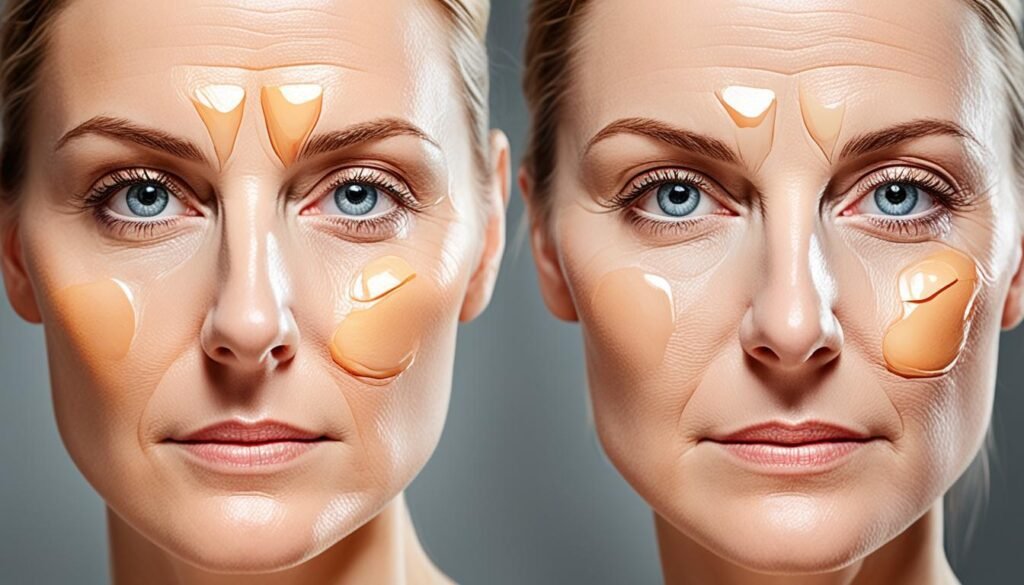
Certain sleep disorders, such as sleep apnea and insomnia, can have a significant impact on both sleep quality and skin health. Let’s take a closer look at how these sleep disorders can disrupt sleep patterns and negatively affect the skin.
Sleep Apnea and Skin Aging
Sleep apnea is a sleep disorder characterized by frequent disruptions in breathing during sleep. These interruptions can lead to decreased oxygen levels in the body, which in turn can increase oxidative stress and inflammation. Both oxidative stress and inflammation contribute to skin aging, including the formation of wrinkles and a loss of skin elasticity.
Insomnia and Impaired Skin Repair
Insomnia, on the other hand, involves difficulty falling asleep or staying asleep. This sleep disorder can lead to sleep deprivation, which hinders the skin’s natural ability to repair and rejuvenate itself during the night. Sleep is a crucial time for the skin to recover from daily damage and regenerate new cells. Sleep deprivation can disrupt this process, resulting in dull and tired-looking skin.
Importance of Proper Diagnosis and Treatment
Properly diagnosing and treating sleep disorders is essential not only for improving sleep quality but also for maintaining healthy skin. Seeking medical advice and undergoing sleep studies can help identify the root causes of sleep disturbances and provide targeted treatments. By addressing sleep disorders, individuals can restore their sleep patterns and promote overall skin health.
Ensuring adequate and quality sleep is essential for maintaining youthful and healthy skin. Sleep disorders can disrupt this delicate balance and contribute to skin aging. Understanding the impact of sleep disorders on skin health underscores the importance of seeking diagnosis and treatment to maintain both sleep quality and skin rejuvenation.
The Role of Stress Management in Sleep and Skin Health
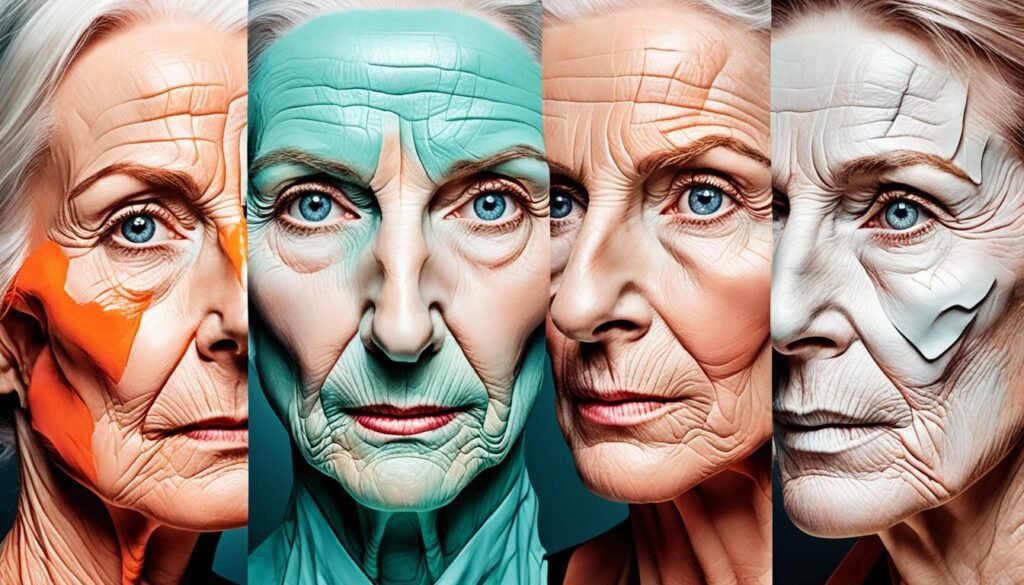
Chronic stress can significantly impact both sleep quality and skin health. The relationship between sleep and stress is intricate, as stress can disrupt sleep patterns, leading to sleep deprivation, which in turn can accelerate skin aging. The impact of stress on the skin goes beyond sleep disturbances, as it can impair the skin’s barrier function and increase inflammation, giving rise to various skin conditions.
To maintain better sleep and promote healthier skin, it is crucial to incorporate effective stress management techniques into our daily routines. Regular exercise has been shown to reduce stress levels and improve sleep quality. Engaging in relaxation techniques, such as meditation or deep breathing exercises, can also help alleviate stress and promote better sleep.
Seeking social support and maintaining healthy relationships can further enhance stress management efforts, providing a sense of emotional well-being and resilience. Remember, managing stress is not only beneficial for sleep, but it also contributes to healthier skin.
By addressing stress and making self-care a priority, we can improve sleep quality and support skin health. It is essential to create a holistic approach that takes into consideration both sleep and skin health in order to achieve optimal well-being.
The Impact of Stress on Skin Aging
Stress can accelerate the aging process by influencing various biological pathways involved in skin health. Here are some key ways in which stress can impact the skin:
- Inflammation: Chronic stress can increase inflammation in the body, leading to a range of skin conditions such as acne, eczema, and psoriasis.
- Collagen breakdown: Stress can contribute to the breakdown of collagen, a protein that maintains the skin’s firmness and elasticity. This can result in the formation of wrinkles and sagging skin.
- Impaired skin barrier function: Stress can disrupt the skin’s natural barrier, making it more susceptible to damage from external factors like pollution and UV radiation.
- Delayed wound healing: High levels of stress hormones can hinder the skin’s ability to heal wounds effectively, prolonging the recovery process.
It is evident that the impact of stress on skin aging goes beyond mere cosmetic concerns. By managing stress and prioritizing self-care, we can mitigate these effects and promote healthier, more youthful-looking skin.
Stress Management Techniques for Better Sleep and Healthier Skin
“The greatest weapon against stress is our ability to choose one thought over another.” – William James
There are various stress management techniques that can help improve sleep quality and support skin health. Here are some effective strategies:
- Exercise regularly: Engaging in physical activity helps reduce stress levels and promotes better sleep. Aim for at least 30 minutes of exercise most days of the week.
- Practice relaxation techniques: Incorporate relaxation techniques such as meditation, deep breathing exercises, or yoga into your daily routine to help calm the mind and reduce stress.
- Seek social support: Maintaining strong social connections and seeking support from loved ones can provide a sense of comfort, reduce stress, and promote better sleep.
- Improve time management: Effective time management can help reduce stress by providing structure and prioritizing tasks. Set realistic goals and create a schedule that allows for adequate sleep and self-care.
- Establish a bedtime routine: Create a relaxing bedtime routine that signals to your body that it’s time to wind down. This may include activities like taking a warm bath, reading a book, or practicing relaxation exercises.
By incorporating these stress management techniques into your daily life, you can help improve sleep quality and support the health of your skin. Remember, stress management is a valuable tool in your journey towards better sleep and healthier, more radiant skin.
| Stress Management Techniques | Benefits |
|---|---|
| Regular exercise | Reduces stress, improves sleep quality |
| Relaxation techniques | Calms the mind, reduces stress, promotes better sleep |
| Seeking social support | Provides emotional well-being, reduces stress levels |
| Effective time management | Reduces stress, creates time for adequate sleep and self-care |
| Establishing a bedtime routine | Promotes relaxation, signals the body to prepare for sleep |
Conclusion
Quality sleep is crucial for maintaining healthy, youthful skin. The link between sleep and skin aging is undeniable, with chronic poor sleep quality accelerating the aging process and causing various skin concerns such as wrinkles, a dull complexion, and impaired healing. To improve both sleep quality and skin health, it is essential to prioritize sleep and practice good sleep hygiene.
Managing stress, protecting the skin from UV damage, and maintaining a balanced diet and lifestyle are additional strategies that can enhance the benefits of quality sleep. By incorporating these practices, individuals can optimize their skin rejuvenation and overall well-being.
Prioritizing sleep means ensuring that you have a consistent sleep schedule and creating a sleep-friendly environment that is quiet, dark, and cool. Avoiding electronic devices before bedtime and establishing a calming bedtime routine can also help promote better sleep.
Remember, sleep is not just a luxury but a necessity. By giving your body the rest it needs, you are investing in the health and vitality of your skin. So, take care of yourself, prioritize sleep, and let your skin reap the rewards of a good night’s sleep.
FAQ
How does sleep affect skin aging?
Sleep plays a crucial role in maintaining healthy skin and preventing premature aging. Chronic poor sleep quality can lead to higher levels of intrinsic skin aging, impaired skin barrier function, slower recovery from UV damage, and lower satisfaction with appearance.
What are the effects of sleep deprivation on the skin?
Lack of sleep can result in paler skin, wrinkles, drooping eyelids, dark circles under the eyes, changes in complexion such as peeling and dehydration, and increased production of oily secretions. It can also impact face perception and make individuals appear sadder and more fatigued.
What are the benefits of quality sleep for the skin?
Quality sleep promotes the production of growth hormones that aid in muscle growth and cell repair, including collagen production essential for skin elasticity. Sleep helps rejuvenate skin cells, repair damaged skin, restore the skin from exposure to environmental stressors, and regulate the body’s circadian rhythm for various skin functions.
What is the role of melatonin in skin health?
Melatonin, a hormone that regulates sleep-wake cycles, acts as a powerful antioxidant and protect against oxidative stress, reducing wrinkles and improving skin elasticity. It also helps regulate the body’s circadian rhythm for skin cell repair and maintaining a clear complexion.
How does sleep impact inflammation and immune function in the skin?
Quality sleep maintains a healthy immune system and regulates inflammation. Lack of sleep can lead to increased production of inflammatory cytokines, skin inflammation, impaired healing, oxidative stress, DNA damage, and impaired DNA repair mechanisms.
What are some tips for improving sleep and preventing skin aging?
Practice good sleep hygiene, maintain a regular sleep schedule, create a sleep-friendly environment, avoid electronic devices before bedtime, establish a calming bedtime routine, engage in regular exercise, manage stress levels, and incorporate relaxation techniques, such as meditation and deep breathing.
How do diet and lifestyle affect sleep and skin health?
A balanced diet that includes nutrient-rich foods and certain nutrients like vitamins A, C, and E, and omega-3 fatty acids can support optimal sleep and skin health. Avoiding stimulants like caffeine and alcohol, managing stress, and maintaining a healthy weight can also improve both sleep and skin health.
Why is sun protection important for skin health?
Protecting the skin from UV damage is crucial for maintaining skin health and preventing premature aging. UV exposure can cause DNA damage, oxidative stress, inflammation, and contribute to skin aging. Wearing sunscreen, seeking shade, and wearing protective clothing and accessories minimize sun damage.
What is the role of sleep disorders in skin aging?
Sleep disorders like sleep apnea and insomnia can disrupt sleep patterns and negatively impact skin health. Sleep apnea can increase oxidative stress and inflammation, while insomnia can impair the skin’s ability to repair and rejuvenate itself. Proper diagnosis and treatment of sleep disorders are essential for maintaining sleep quality and skin health.
How does stress management impact sleep and skin health?
Chronic stress can disrupt sleep patterns and accelerate skin aging. Managing stress through regular exercise, relaxation techniques, and seeking social support can promote better sleep and healthier skin. Prioritizing stress management and self-care is crucial for both sleep and skin health.

